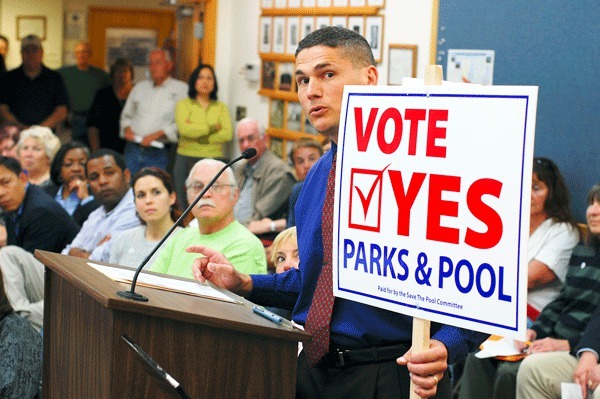Political signs are once again proving to be a thorn in the side of Oak Harbor Mayor Jim Slowik.
The city was stung this week when a representative from the state Public Disclosure Commission called and informed city officials that the allowance of a political sign at last week’s council meeting was a violation of state campaign laws.
After having just been dinged for another recent controversy concerning campaign signs and free speech, Slowik said the city was trying to do the right thing by allowing the sign in the meeting. The sign owner was even pulled aside and specifically instructed not to advocate for the ballot measure.
However, when asked by the Whidbey News-Times, Public Disclosure Commission spokeswoman Lori Anderson said the sign should not have been allowed. The agency, created by a voter initiative in the 1970s, is the state’s regulatory arm charged with enforcing Washington campaign laws.
She claims it violated RCW 42.17.130, which says elected officials and public employees can’t authorize the use of public facilities for the purpose of assisting a campaign for election or for the promotion of a ballot proposition.
According to the law, “facilities” include everything from office stationery and employee time to the use of equipment. In this case, the problem is that council meetings are broadcast on channel 10, a service paid for by taxpayers.
Anderson said it’s the responsibility of those running the meeting to ensure all the state rules are being followed.
“A city council meeting has to be policed by elected or city officials in charge,” she said.
The sign in question belonged to Scott Vogt, who identified himself as the president of the “Save the Pool Committee.” Speaking during the open public comment period, Vogt said the group was formed to help the North Whidbey Park and Recreation District pass its operations levy which is needed to operate the swimming pool.
According to Slowik, city officials saw the potential for problems when Vogt first walked in. While the same RCW cited by Anderson does allow elected bodies to pass resolutions for or against issues — Oak Harbor has done it in the past — there are very specific steps that must be taken.
The issue has to be noticed appropriately, including the title and number of the ballot measure, and everyone, including elected officials and the public, should be afforded equal time to speak.
Since this hadn’t been done, Slowik said Vogt was allowed to speak on the condition that he not advocate for the levy. Vogt appeared to honor the request, sticking to general information such as cost and what the levy would pay for.
As for the sign, Slowik said he felt the city was “under a microscope” following a recent controversy about a city ordinance that limits the posting of political signs to 60 days before an election.
A court precedent says such limits are unconstitutional and the city quickly changed the law. Slowik said the issue has made it clear “we cannot limit political signs in any manner.”
With the Public Disclosure Commission’s opinion on the pool sign, Slowik said it’s hard to know what to do.
“We have courts pointing one way and the PDC going the other,” he said.
Anderson said she can understand the frustration but that the argument only goes so far. By that logic, people can walk into City Hall and post political signs on the walls. She said she doubts that would be tolerated.
While it’s not uncommon for elected officials to want to preserve public comment periods as a place where the public is truly free to say whatever it wants, there are circumstances that warrant censorship, she said.
According to Anderson, no action is to be taken against the city. Her call was merely an “educational opportunity” prompted by the calls from the News-Times.



